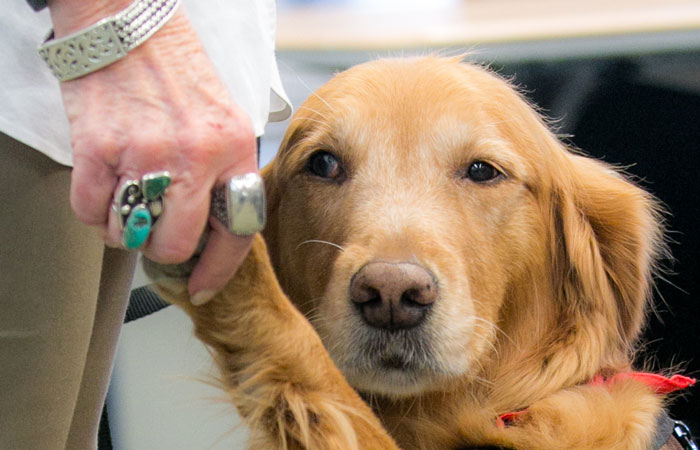Vets and pets play key role during disaster response
By Alex Branch

Among the many lessons from Hurricane Katrina was that the bond between humans and animals cannot be ignored during disaster response.
With no plan by emergency responders to account for household pets during rescues 12 years ago, many families refused to board helicopters, boats or buses without their beloved household pets.

That’s why this week about two dozen Texas A.M. University veterinarians and veterinarian technicians were deployed outside Houston, and evacuee shelters in Dallas and Fort Worth included carefully crafted plans to care for pets of people who fled Hurricane Harvey.
From preventing disease outbreaks among rescued animals to providing care for wounded household pets and search and rescue dogs, veterinarians today fill important roles in disaster response, said Katherine Fogelberg, DVM, PhD, Assistant Professor in the UNT Health Science Center School of Public Health.
“Research has shown that between 30 to 70 percent of people will not evacuate their homes without their household pets,” Dr. Fogelberg said. “Katrina revealed that the human-animal bond must be taken into account, especially during disasters that are expected to last for an extended time.”
Dr. Fogelberg, a member of the Society for Disaster Medicine and Public Health, had advocated for increased involvement of veterinarians during disaster response.
Just like when humans are housed together for long periods in tight quarters, sheltered animals are at high risk for disease outbreaks in shelters, such as influenza. The vaccine and health histories of many of the animals rescued during disasters are unknown, said Dr. Fogelberg, who recently was named the 2017 Public Health Veterinarian of the Year by the American Association of Food Safety and Public Health Veterinarians.
“Some diseases can pass from animals to humans so preventing those post-disaster disease outbreaks is a critical aspect of the public health response,” she said. “There also is a clear mental health benefit for evacuees who have lost their homes and possessions to know that their pets are safe and being properly cared for.”
Some obstacles prevent veterinarians from responding to disasters. For example, veterinarians are licensed to practice only in individual states and there is not a good system in place to allow them to practice temporarily in other states during disasters.
Next month, Dr. Fogelberg will speak at a meeting of the Society for Disaster Medicine and Public Health about the potential to further expand the roles of veterinarians in disaster response.
“There is a concept known as ‘One Health’ recognizing that the health of people is connected to the health of animals,” she said. “Veterinarians will continue to have a growing role in the response to disasters like Hurricane Harvey.”





Social media